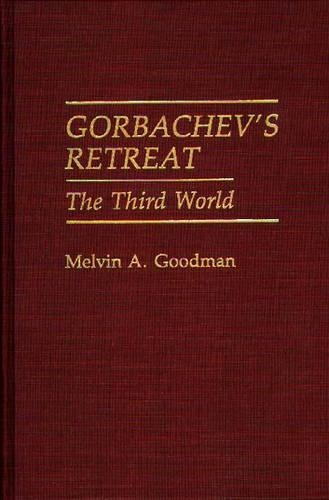
Gorbachev's Retreat: The Third World
(Hardback)
Publishing Details
Gorbachev's Retreat: The Third World
By (Author) Melvin A. Goodman
Bloomsbury Publishing PLC
Praeger Publishers Inc
30th June 1991
United States
Classifications
Tertiary Education
Non Fiction
International relations
327.4701724
Physical Properties
Hardback
224
Description
In this inquiry into the Soviet retreat from the Third World, Melvin A. Goodman analyzes Gorbachev's policy from the standpoint of disillusionment with the Third World. He cites, among other reasons for the retreat, the diminished strategic significance of the Third World to current Soviet leadership, the limitations for Soviet power projection in distant areas, and the dilemmas in Moscow's relations with Third World regimes. Goodman contends that Gorbachev's foreign policy shift to achieve a more stable international arena and a less militant Soviet stance allowed Moscow to focus on its internal economic problems. This volume provides the first exploration of Afghanistan as a watershed in Soviet thinking on the Third World and discusses the current Soviet emphasis on conflict management and resolution in Third World states - particularly Afghanistan, Angola, Ethiopia, and Nicaragua. "Gorbachev's Retreat" explains how co-operation with the United States improves Moscow's image in the West and tends to stabilize Third World flash points. Data on Soviet military and economic assistance to the Third World as well as Third World responses to the Soviet policy are also presented. The volume examines Soviet retrenchment and retreat in the Third World; analyzes Gorbachev's decisions relative to Third World relationships; zeroes in on the withdrawal from Afghanistan; explores some of the reasons for Soviet power limitations; and assesses the regional implications of Gorbachev's "New Political Thinking". It then looks at Soviet power projection and crisis management, Soviety military and economic aid, and Soviet retreat in the 1990s. The volume should be particularly useful to undergraduate and graduate courses in foreign policy and international relations as a discussion of the impact of the new Soviet policy in the Third World and the consequences for US Soviet relations.
Reviews
Gorbachev's Retreat is quite interesting, particularly in view of events in the Soviet Union and the Middle East. It is well documented from a variety of secondary sources, and it concludes with a helpful bibliographic essay.-MILITARY REVIEW
Hence, it is a pleasure to read an integrated, well thought-out interpretation of Gorbachev's innovations in Soviet foreign policy toward the Third World written by a single author with long experience in the field.-The Russian Review
"Hence, it is a pleasure to read an integrated, well thought-out interpretation of Gorbachev's innovations in Soviet foreign policy toward the Third World written by a single author with long experience in the field."-The Russian Review
"Gorbachev's Retreat is quite interesting, particularly in view of events in the Soviet Union and the Middle East. It is well documented from a variety of secondary sources, and it concludes with a helpful bibliographic essay."-MILITARY REVIEW
Author Bio
MELVIN A. GOODMAN is Professor of International Relations at the National War College in Washington, D.C. He was Senior Analyst for Soviet Affairs at the CIA and the Department of State. He has written a book on the military dimension of Soviet policy, and will soon publish another on the implications of new thinking for Soviet-American cooperation in the Third World. He has written on Soviet policy for Middle East Journal, Journal of Northeast Asian Studies, and International Journal.
